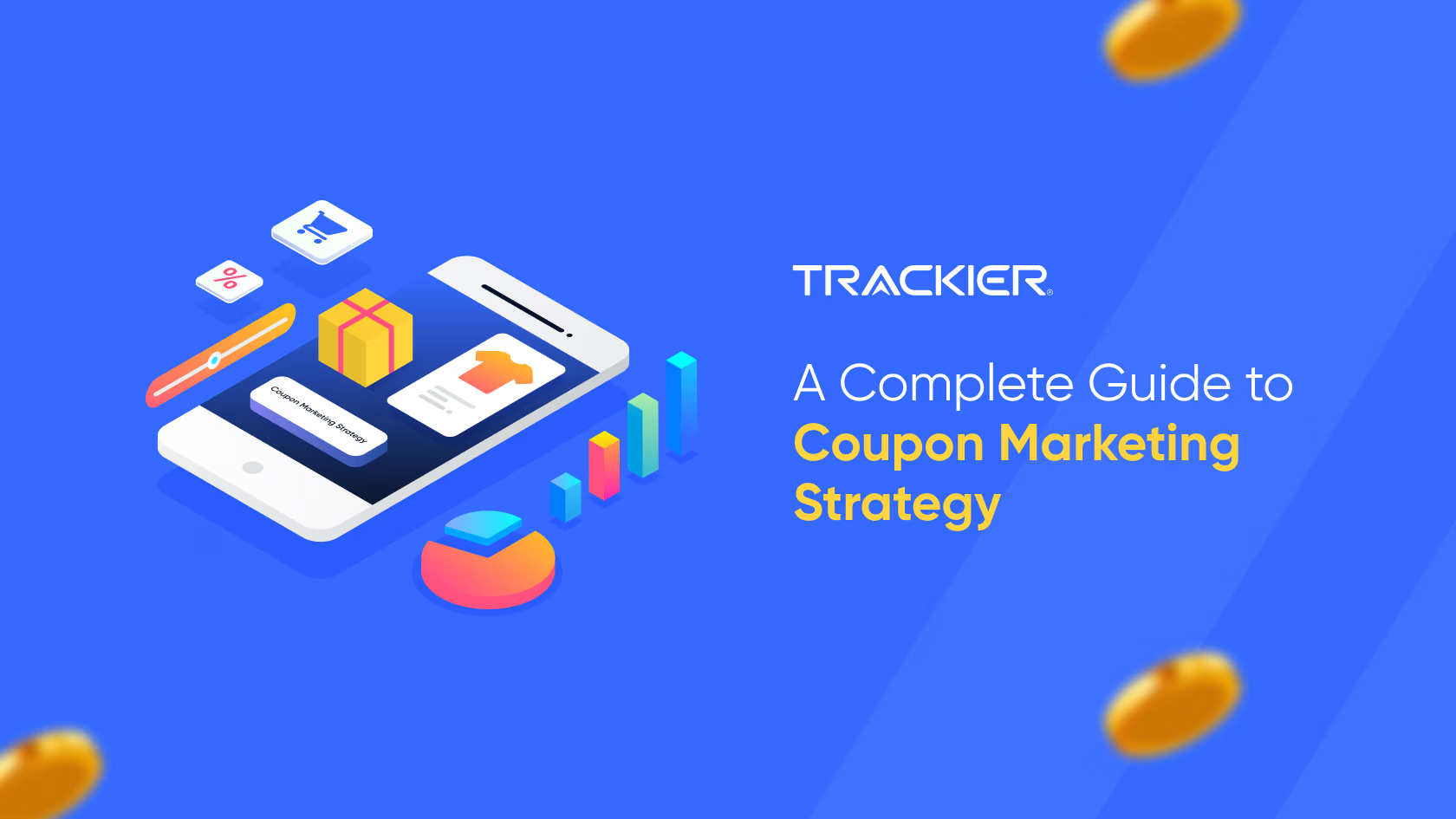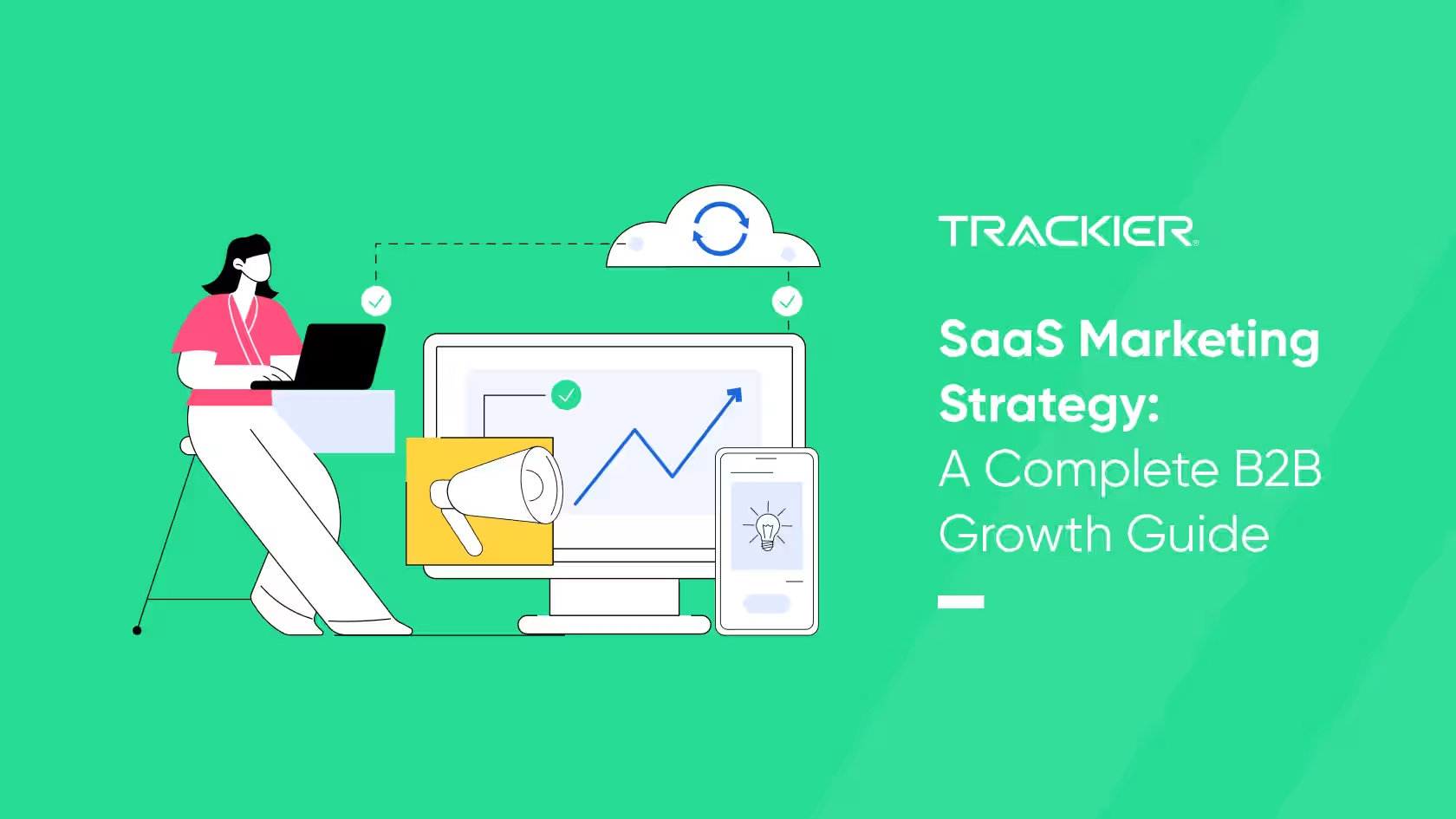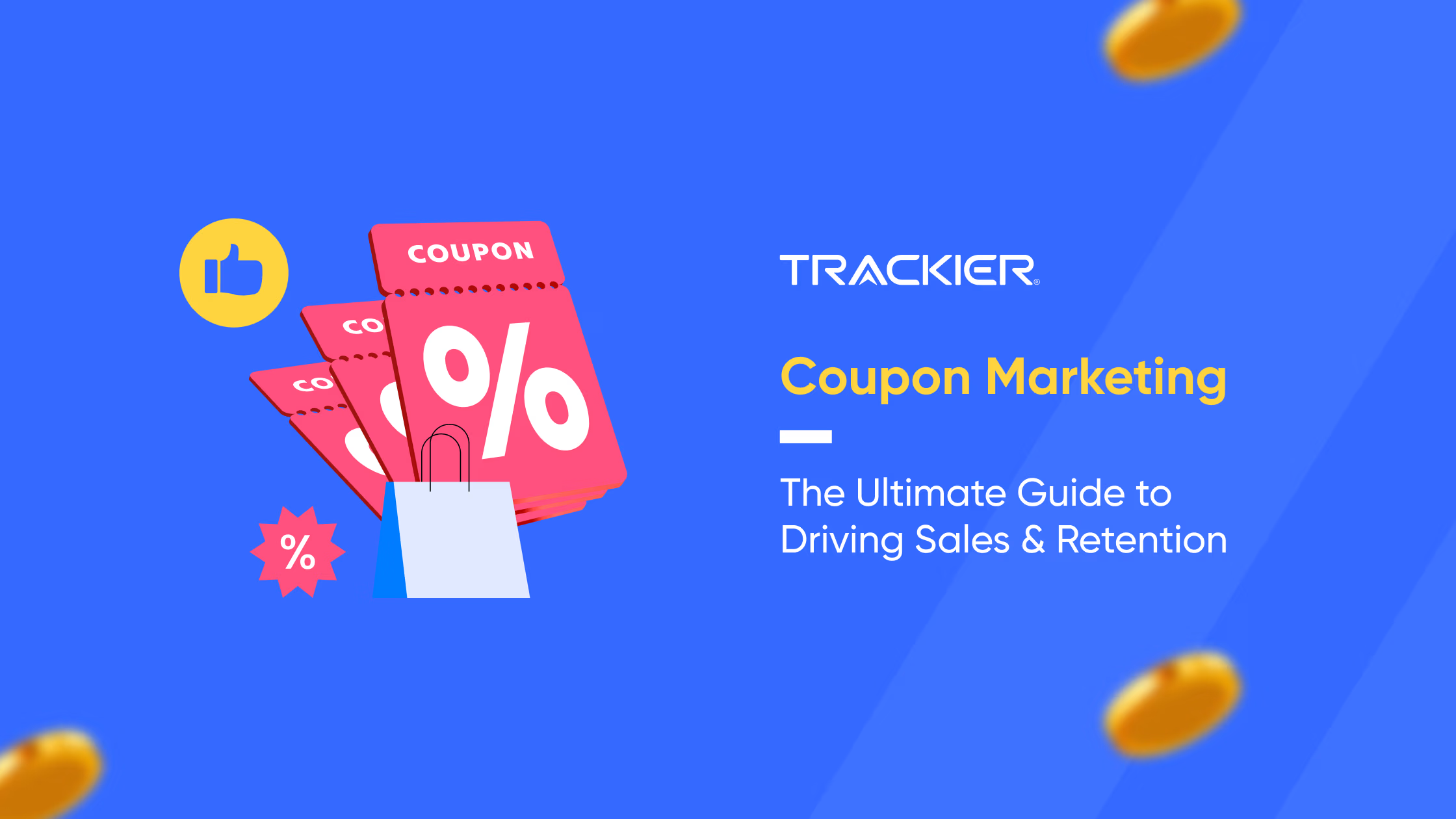Every year, it becomes more difficult to acquire new customers. Ads are more expensive, and consumer attention spans are short. Many companies spend a lot of money on advertising efforts that drive traffic but don’t result in repeat business.
A coupon marketing strategy can help with this. Brands can both draw in new customers and promote ongoing sales with customized and well-timed discounts. A systematic method makes sure that coupons generate genuine growth rather than just one-time purchases, in contrast to casual discounting.
Coupon promotions are much more effective when combined with tools like affiliate tracking software. Businesses can monitor redemptions, examine performance, and determine which offers bring the greatest return on investment. In a competitive industry, the right coupon marketing strategy can bring loyal, repeat consumers.
What is Coupon Marketing?
Applying discount coupons, promo codes, or digital coupons to entice and retain customers is referred to as coupon marketing. Coupons promote consumers to purchase by reducing the price or offering additional value, thereby making it easier for businesses to shape consumer decisions.
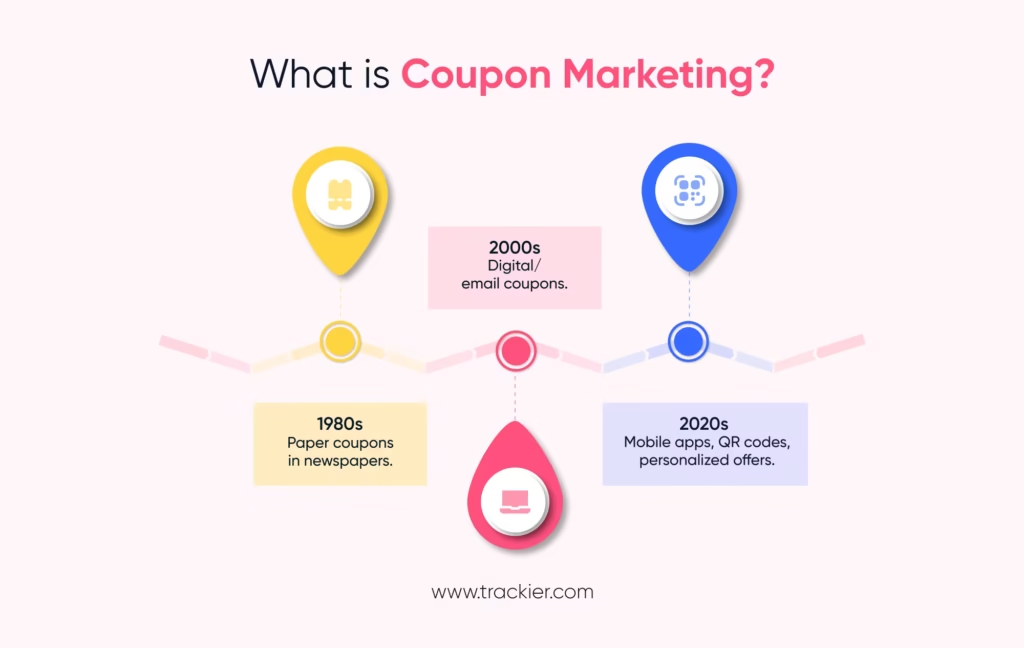
Coupons were traditionally given out in magazines and newspapers. These days, companies employ an online coupon marketing strategy by using digital channels like social media, email campaigns, and mobile apps to reach clients directly. Coupon marketing is now quicker, measurable, and inexpensive as a result of this change.
Businesses use coupon marketing strategy to increase consumer loyalty, increase sales, and raise awareness. Coupon marketing strategy continues to be one of the best approach to increase interaction in both online and offline markets, regardless of whether they are offered as a flat discount, a buy one, get one free offer, or a seasonal promotion.
What is a Coupon Marketing Strategy?
A coupon marketing strategy is a systematic method that uses coupons to achieve business objectives such as better sales, new customers, or repeat business. Unlike single sales, a plan ensures that coupons are created with certain goals, proper targeting, and quantifiable outcomes.
For instance, applying a flat rate discount of 20% on the first-time purchase encourages new customers, while loyalty offers encourage repeat customers to come back. Structured coupon marketing strategy employed by brands make a trade-off between providing value to customers and ensuring profitability.
Coupon marketing strategy attempts to optimize return on investment with the help of matching promotions with customer behavior, business objectives, and data-driven intelligence.
The 4 Core Marketing Strategies and Where Coupons Fit In
Marketing is frequently based on the 4Ps framework: Product, Price, Place, and Promotion.
- Product: What you’re selling, including advantages and features.
- Price: How much customers pay, including discounts and estimated value.
- Place: The online or physical location where your product is sold.
- Promotion: The process of attracting and retaining customers through advertising, sales, and campaigns.
Coupon marketing strategy is closest to promotion because it assists companies in getting attention and encouraging buying behavior. Coupon marketing also has a tremendous effect on price because sales and discounting directly impact the buying decision of consumers. Coupons become an excellent means of competing and facilitating faster buying decisions when they drive both areas.
Benefits of Coupon Marketing Strategy
A well-planned coupon marketing strategy helps customers and businesses in many ways. Instead of depending on random discounts, a systematic strategy makes sure that each coupon serves a specific purpose.
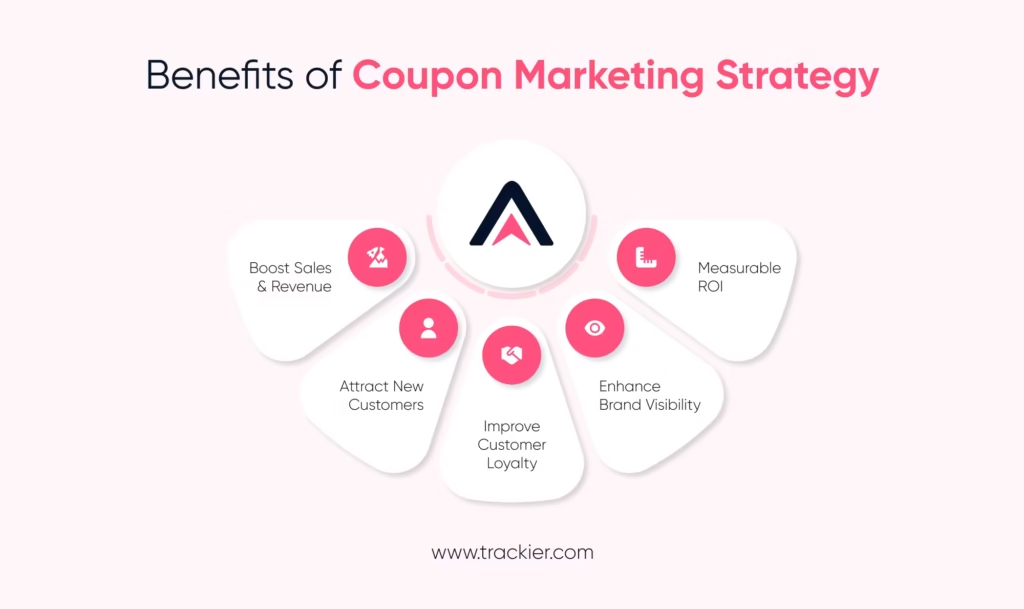
1. Increases Revenue and Sales
Coupons create a sense of urgency in consumers, motivating them to finish their purchases quickly. First-purchase discounts or exclusive offers frequently increase conversions and lower cart abandonment.
2. Attracts New Clients
Using introductory offers is a good coupon marketing strategy to attract new customers. They make it easier for consumers who hesitate to test a new product or brand.
3. Improves Client Loyalty
Relationships get better when loyal customers receive special coupons. Personalized offers increase the likelihood of recurring business by making customers feel valued.
4. Increases Brand Awareness
Coupons distributed via social media or affiliate partners expand reach, placing the brand in front of new audiences at a minimal cost.
5. Provides Measurable ROI
Businesses can evaluate campaign performance and measure coupon redemption rates using suitable tracking, ensuring that discounts support long-term profitability.
Types of Coupon Marketing Strategies
Your audience, company objectives, and timing all influence the best coupon marketing strategy. Here are some of the more widely used and successful types:
1. Digital Coupons
Digital coupon marketing strategy assists businesses in reaching customers fast via emails, mobile apps, or QR codes. Coupons are more effective than conventional discounts as they may be strongly targeted based on past browsing activities or purchases. For instance, an e-commerce fashion store can offer a 15% discount code to customers who leave their baskets.
2. Social Media Coupons
Social media platforms are an effective way of sharing special codes. In addition to driving sales, limited-time offers on Instagram or TikTok drive engagement metrics such as likes, shares, and comments. In the case of product launches or campaigns where awareness is equally important as conversions, social coupons often work best.
3. Referral Coupons
Referral coupons are used to reward new and current customers. The “double incentive” attracts new consumers at very low cost and induces loyalty. For example, a meal delivery service might offer a $10 discount to both the referral and the new user, making both parties feel appreciated.
4. Seasonal & Event-Based Coupons
These are in line with consumer behavior during specific times of the year, such as Black Friday, back-to-school season, and regional festivals. Customers are already in a buying mindset; therefore, event-based coupons promote higher conversions. They assist brands in getting rid of seasonal stock.
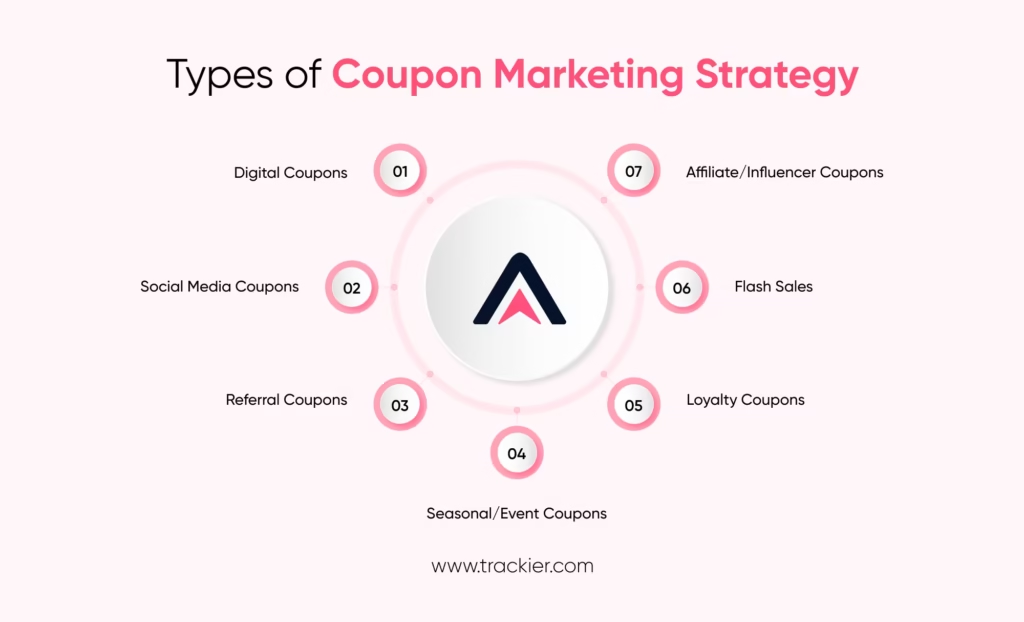
5. Loyalty Coupons
Brand relationships become stronger when loyal customers or members of loyalty programs receive special discounts. Offerings like “spend $200, get $20 off your next purchase” encourage clients to stay with a business rather than moving to a competitor. This coupon marketing strategy lowers churn and improves retention over time.
6. Flash Sales & Limited-Time Offers
These coupons generate a sense of urgency, encouraging buyers to make decisions swiftly. They are especially successful in removing excess stock or promoting new products in a competitive market. A popular example is a “24-hour only” offer that immediately increases traffic and conversions.
7. Affiliate & Influencer Coupons
To share exclusive promo codes, brands collaborate with influencers or affiliates. This increases reach and streamlines campaign tracking. Because these coupons are frequently customized (e.g., “INFLUENCER20”), they appear more genuine and encourage followers to trust the recommendation.
Businesses that mix and match these coupon marketing strategy can appeal to a variety of customer groups while staying profitable.
How Do You Use Coupons?
Discounts alone are insufficient. The way coupons are created and distributed influences whether they increase or decrease sales. A carefully developed coupon marketing strategy makes sure that they benefit the business and its customers.
For Businesses
- Segment your audience: Give different coupons to big spenders, devoted consumers, and first-time purchasers.
- Customize offers: Send relevant discounts, such as birthday coupons or product-specific offers, based on consumer data.
- Monitor performance: To prevent excessive discounting and improve subsequent campaigns, track redemption rates, conversions, and ROI.
For Customers
- Maximize savings: Look for coupons that can be combined with existing promotions or loyalty points.
- Plan your purchases: Make smart use of coupons to increase your savings during seasonal deals.
- Stay updated: Getting access to special coupon offers is guaranteed when you sign up for brand newsletters or apps.
Best Practices for a Successful Coupon Marketing Strategy
A successful coupon marketing strategy is more than just giving away discounts; it’s about adding value without losing revenue. Businesses can achieve that balance by adopting the following best practices:
1. Set Specific Goals
Explain the goal of the coupon marketing strategy, such as increasing average order value, retaining regular consumers, or encouraging first-time purchases. Random discounting is avoided with clear objectives.
2. Segment Your Viewers
Targeting the proper audience with the right offer can be guaranteed by providing a “welcome discount” to new users and rewarding current customers with loyalty coupons.
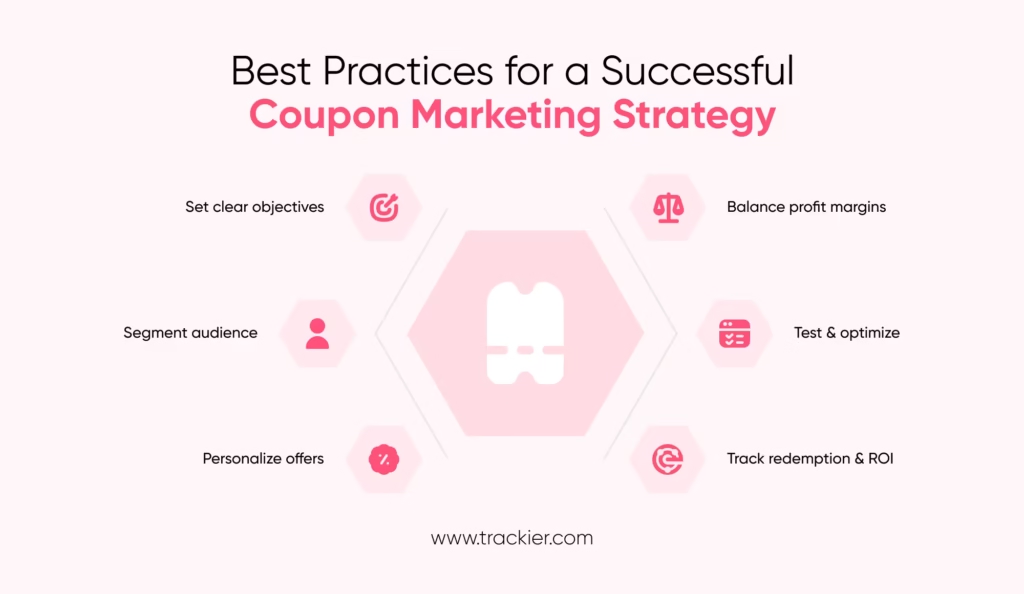
3. Customize Offers
Generic coupons could be overlooked. Personalized discounts, such as location-based deals, birthday gifts, or product recommendations, feel more relevant and increase user engagement.
4. Use Time-Bound Coupons
If a coupon is always available, it loses its value. Limiting validity (for example, “valid until weekend” or 48 hours) increases urgency and promotes faster conversions.
5. Create Exclusiveness
Exclusive offers for app users, VIP members, and email subscribers increase consumer loyalty and make them feel appreciated. Also, it promotes ongoing engagement and sign-ups.
6. Balance Discounts with Profitability
Avoid giving away too much. Urgency can be created by even modest but well-timed discounts. Before starting a promotion, always figure out how coupons can impact your margins.
7. Test and Optimize
Conduct A/B testing on distribution channels, discount percentages, and coupon types. Use the findings to optimize ROI and improve subsequent campaigns.
8. Combine Coupons with Loyalty Programs
Include coupons in loyalty or referral programs as an alternative to one-time discounts. By doing this, you promote long-term client retention as opposed to temporary sales increases.
9. Monitor for Misuse
Profits can be harmed by coupon misuse, such as stacking codes or exploiting old discounts. To prevent revenue leakage, set explicit guidelines and use dependable tools to monitor coupon usage.
10. Measure ROI and Redemption
Success can be measured by keeping an eye on client retention, sales uplift, and redemption rates. Coupons will certainly boost growth rather than reduce revenues because of integrated tools and analytics.
Businesses can ensure coupons serve as a long-term growth tool rather than a temporary sales boost by following these best practices.
Watch: Winning Coupon Marketing Strategies
Gain actionable insights from the Trackier + JioCoupons webinar, where industry experts break down high-converting coupon marketing strategy and real-world use cases.
Coupon Advertising: How Brands Promote Their Coupons
Coupon creation is only half the story; successful promotion is what really makes a difference. Discounts are delivered to the appropriate audience at the appropriate moment because of coupon advertising. The following are some of the best methods used by brands to promote their coupons:
1. Paid Ads
Coupon codes are often highlighted by brands via display networks, Facebook Ads, and Google Ads. Targeting specific audiences and generating quick traffic to coupon landing pages are two benefits of paid advertising. Additionally, businesses can automate lead tracking by sending Google Ads and Facebook leads to Google Sheets for instant follow-up with interested customers.
2. Promotion on Social Media
Posting coupons on Twitter, Instagram, or TikTok creates anticipation and promotes interaction. Influencer-led campaigns or time-limited “story” codes increase visibility and generate urgency.
3. Email Marketing
One of the most dependable media for coupon advertising is still email. Compared to generic ads, customized promo codes delivered to subscribers’ inboxes often end up in higher conversion rates.
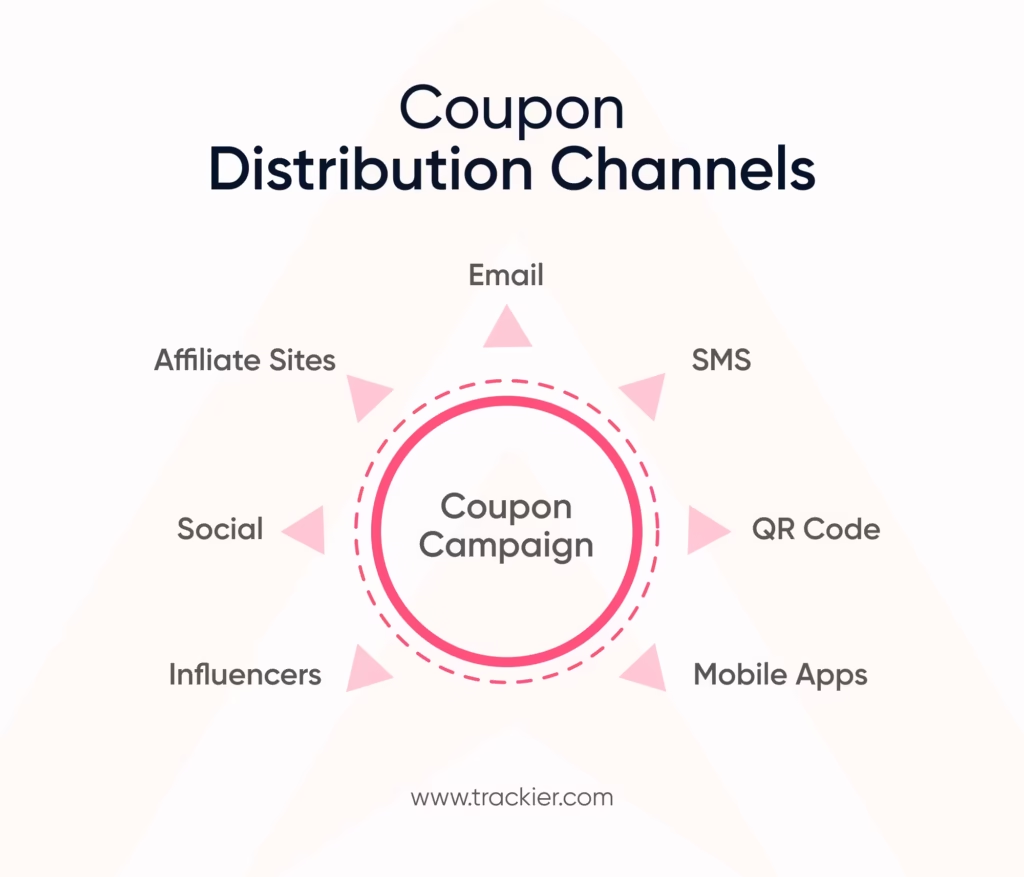
4. Push Notifications & SMS
SMS advertising and push notifications are powerful tools for companies that are mobile-first or app-based. They provide coupons right away, which makes it simpler to attract customers.
5. Affiliate & Influencer Partnerships
Many businesses work with influencers or affiliates that share exclusive promotional codes with their followers. This increases reach and allows performance tracking using attribution tools.
Tools & Platforms for Digital Coupon Marketing
Running coupons without the right tools can quickly become messy. To handle campaigns, businesses require dependable systems for everything from distribution to redemption tracking. Digital coupon marketing tools can help with that. They offer data for measuring ROI, improving targeting, and simplifying processes.
1. Coupon Distribution Tools
These let businesses distribute coupons via SMS, social media, mobile apps, and emails. Without requiring manual effort, automated distribution makes sure that consumers receive offers on time.
2. Tracking & Analytics
Coupons are only effective if their performance is tracked. Brands can track redemption rates, determine high-performing affiliates or channels, and figure out which codes generate the most conversions by integrating campaigns with affiliate tracking software.
3. CRM & Loyalty Program Integration
Businesses can customize offers for loyal consumers by integrating coupons with loyalty programs. For example, rewarding loyal customers with exclusive coupons increases engagement and retention.
4. Partner Ecosystem Integrations
Platforms like Trackier provide an ecosystem of partners that link to communication tools, analytics platforms, and payment methods. By doing this, discount promotions will be guaranteed to be in perfect harmony with wider sales and marketing efforts.
The JioCoupons and Trackier case study demonstrates how advanced integrations and attribution can help marketers profitably expand coupon programs. The partnership demonstrates how the appropriate technology can revolutionize coupon marketing with enhanced attribution accuracy and more efficient CPS/CPI campaigns.
5. Fraud Prevention
Fraud detection tools aid in stopping coupon code abuse, including repeated redemptions by the same person or unapproved postings on coupon forums.
With the correct tools and integrations, digital coupon marketing could grow into a data-driven coupon marketing strategy rather than just a cost-effective strategy.
Challenges in Coupon Marketing
A coupon marketing strategy has its limitations, even though it can produce amazing results. Businesses that ignore these risks run into the possibility of losing money or damaging their reputation.
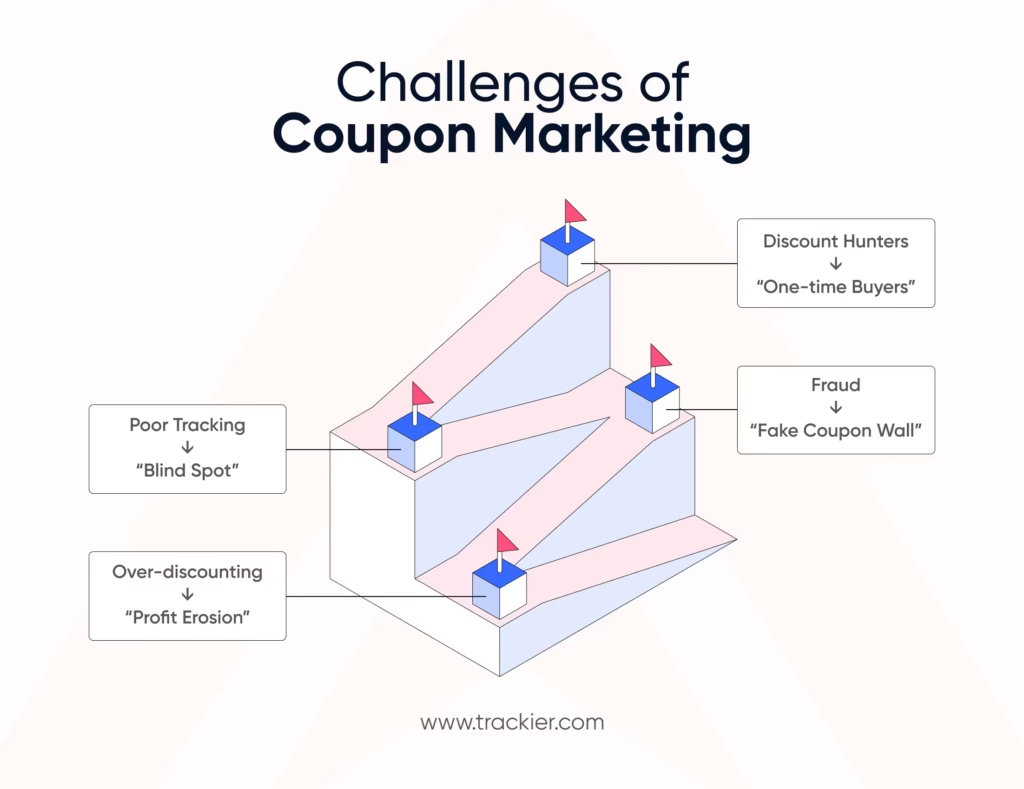
1. Over-Discounting
Giving too many coupons may lead to consumers only making purchases during sales. Profit margins are lowered, and brand value is weakened.
2. Fraud & Misuse of Coupons
Campaign profitability could be impacted by multiple purchases by the same user or by unauthorized code sharing. Coupons have the potential to quickly turn into a problem if fraud prevention measures are not implemented.
3. Customer Dependency
If clients expect discounts all the time, full-price sales may fall. It’s important to strike the right balance between regular price and discounts.
4. Monitoring ROI
Determining the success rate of coupons is one of the most difficult tasks. Businesses find it difficult to link coupons to real revenue without resources like affiliate tracking software or integrations that track coupon redemptions.
5. Limited Reach Without Promotion
Making coupons is simple, but they won’t have the desired effect if they aren’t promoted through the appropriate channels.
How to Build a Successful Coupon Marketing Strategy
A successful coupon marketing strategy is the one that has been carefully crafted around your business’s goals rather than being random. Brands should develop a methodical strategy that takes into account consumer behavior, channel selection, and performance evaluation rather than merely using discount codes. Here’s an organized approach you can use:
1. Define Your Goals
Clarity should come first. Do you want to promote a new product, reward loyal consumers, reduce cart abandonment, or increase first-time purchases? Your objectives will influence the kind of discount campaign you select.
2. Identify Your Audience
Different types of discounts are valued by different customers. Divide up your audience into groups according to demographics, past purchases, or purchasing habits. Coupons feel more relevant and customized in this way.
3. Choose the Right Coupon Type
Select a structure that aligns with your goals and resonates with your target audience, ranging from referral coupons and BOGO (Buy One Get One) offers to percentage-based discounts and free shipping.
4. Set Clear Terms and Validity
Coupons work best when they convey urgency and exclusivity. Add usage restrictions, expiration dates, and eligibility guidelines for prompt action from customers and maintain brand profitability.
5. Promote Across Multiple Channels
Promote your coupons via email, SMS, social media, mobile apps, or even influencer collaborations, depending on where your audience spends their time. Consistency in distribution ensures more visibility and redemption.
6. Track and Measure Performance
Use digital tools or affiliate tracking software to track coupon performance. Pay attention to revenue, redemption rates, and the purchases of new vs returning customers. This helps in improving your future campaigns.
7. Optimize for the Future
Coupon campaigns should not be one-time events. Experiment with various coupon types, audiences, and channels, then adjust your coupon marketing strategy according to whatever gives the best return on investment. Your strategy remains relevant through constant improvement.
Future of Coupon Marketing
With the rise of digital technology and shifting consumer preferences, the coupon marketing strategy is changing quickly. While traditional paper coupons remain in use, personalized, data-driven, and mobile-first methods are obviously the way forward. The following significant trends will influence coupon marketing going forward:
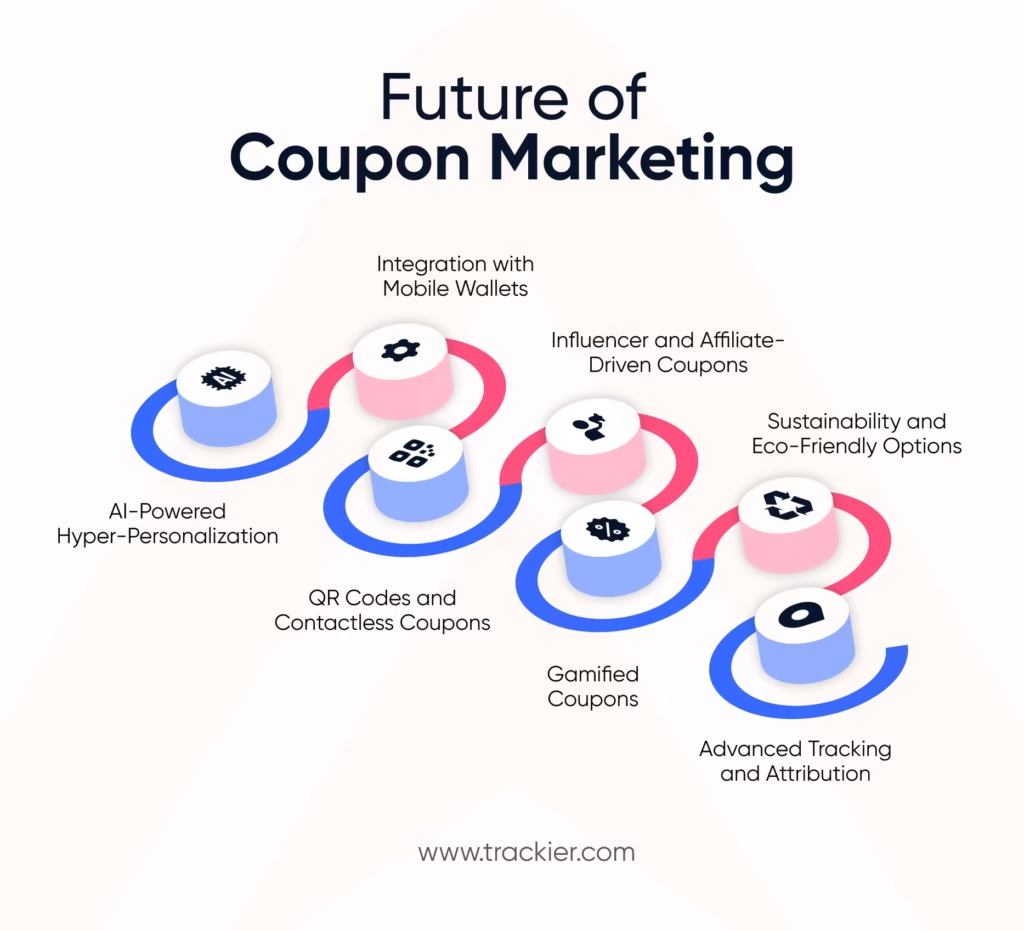
1. AI-Powered Hyper-Personalization
Brands will be able to provide highly customized coupons via AI and machine learning, which are based on browsing patterns, previous purchases, and predictive analytics. Customers will receive offers that are specifically customized to their needs rather than generic discounts.
2. Integration with Mobile Wallets
Digital coupons will become smooth when mobile wallets like Apple Wallet, Google Pay, and others gain popularity. Without typing codes by hand, customers can save and use coupons straight from their mobile phones.
3. QR Codes and Contactless Coupons
Contactless solutions have become more common as a result of post-pandemic buying. Coupons may now be easily scanned with the help of QR codes, which unify online and physical buying.
4. Influencer and Affiliate-Driven Coupons
Creators and affiliate partners are becoming increasingly important means for sharing exclusive coupon codes. Because of this trend, coupon marketing strategy will become an important part of influencer and partnership initiatives.
5. Gamified Coupons
Interactive coupons, like scratch-to-reveal or spin-the-wheel promos, give a playful touch. Gamification makes deals more memorable and keeps people interested.
6. Sustainability and Eco-Friendly Options
Digital coupons will nearly completely replace paper-based ones as consumers’ awareness of sustainability grows, helping businesses align with environmentally friendly practices.
7. Advanced Tracking and Attribution
Performance analytics and affiliate tracking tools will help marketers better understand which discount promotions produce the best return on investment. This guarantees better budget allocation and continuous improvement.
Conclusion
Coupon marketing remains one of the most effective strategies for increasing sales and engaging customers. Businesses can reduce cart abandonment, reward loyalty, and draw in new customers with the correct coupon marketing strategy. Coupons will continue to develop as digital tools and tracking systems advance, giving marketers smarter methods to provide value and measure success.
FAQs
What is a coupon marketing strategy?
A coupon marketing strategy is a planned technique in which businesses use discounts, vouchers, or promotional coupons to attract new customers, increase sales, or retain existing customers. Instead of making random offers, it focuses on creating specific goals, targeting the correct audience, and monitoring performance to optimize ROI while maintaining profitability and customer satisfaction.
What are the 4 marketing strategies?
The four primary marketing techniques are product, price, place, and promotion (commonly known as the 4Ps). Product specifies what you sell, price establishes its worth, location establishes the means of distribution, and promotion deals with client outreach and attraction. Coupon marketing is a type of promotion that helps businesses improve visibility and sales by providing discounts and deals.
What is an example of a coupon?
A 20% off discount code for first-time online shoppers is a typical example of a coupon. For example, an online retailer might give new customers the coupon “WELCOME20.” Customers can lower their overall bill by using this code at the point of sale. These coupons encourage customers to test the brand, reduce cart abandonment rate, and incentivize purchases.
What is couponing in advertising?
The practice of using coupon marketing strategy to draw clients, increase sales, or create brand loyalty is known as couponing in advertising. Coupons are sent out by businesses through affiliate channels, websites, social media, and emails. They function as both an incentive and a measurable marketing tool, as redemption rates show the campaign’s impact.
How to create a coupon code?
To create a coupon code, select the type of discount (%, flat rate, or free shipping), establish limitations such as expiration date and usage limits, then generate a unique code using an e-commerce platform or coupon tool. Share the code via email, social media, or advertisements, and track purchases to evaluate campaign success.
